Book contents
- Frontmatter
- Table of Contents
- Introduction
- Acknowledgmen
- Abbreviation
- WAR AND PEACE
- Roundtable: Woolf and Violence
- Intersections: Surveillance, Propaganda, and Just War
- Modernism and Memorials: Virginia Woolf and Christopher Isherwood
- Taking Up Her Pen for World Peace: Virginia Woolf, Feminist Pacifist. Or Not?
- The Sex War and the Great War: Woolf's Late Victorian Inheritance in Three Guineas
- Sky Haunting: The British Motor-Car Industry and the World Wars
- The 1914 “Expurgated Chunk”: The Great War in and out of The Years
- “beauty, simplicity and peace”: Faithful Pacifism, Activist Writing, and The Years
- Virginia Woolf, Katharine Burdekin, and Britain's Cosmopolitan Musical Culture
- Death in the Air: Virginia Woolf and Sylvia Townsend Warner in World War II
- WORLD WRITER(S)
- ANIMAL AND NATURAL WORLD
- WRITING AND WORLDMAKING
- Notes on Contributors
- Conference Program
- Appendix: Virginia Woolf Conference Exhibit Items, Newberry Library
Death in the Air: Virginia Woolf and Sylvia Townsend Warner in World War II
from WAR AND PEACE
- Frontmatter
- Table of Contents
- Introduction
- Acknowledgmen
- Abbreviation
- WAR AND PEACE
- Roundtable: Woolf and Violence
- Intersections: Surveillance, Propaganda, and Just War
- Modernism and Memorials: Virginia Woolf and Christopher Isherwood
- Taking Up Her Pen for World Peace: Virginia Woolf, Feminist Pacifist. Or Not?
- The Sex War and the Great War: Woolf's Late Victorian Inheritance in Three Guineas
- Sky Haunting: The British Motor-Car Industry and the World Wars
- The 1914 “Expurgated Chunk”: The Great War in and out of The Years
- “beauty, simplicity and peace”: Faithful Pacifism, Activist Writing, and The Years
- Virginia Woolf, Katharine Burdekin, and Britain's Cosmopolitan Musical Culture
- Death in the Air: Virginia Woolf and Sylvia Townsend Warner in World War II
- WORLD WRITER(S)
- ANIMAL AND NATURAL WORLD
- WRITING AND WORLDMAKING
- Notes on Contributors
- Conference Program
- Appendix: Virginia Woolf Conference Exhibit Items, Newberry Library
Summary
This evening I shall hear the news on the wireless.
This man, that man—
A thatcher in Essex may be, a downland shepherd—
Dead at that stroke,
Escaped to a civil death from the impending
Death in the air.
—Sylvia Townsend WarnerIn a diary entry of April 3, 1941, Sylvia Townsend Warner notes: “A very noisy evening. We have lost Benghazi to the German advance. Today the news that Virginia Woolf, missing since Friday [March 28], is now presumed drowned in the Sussex Ouse. I was thinking of her while I weeded, and suddenly received a powerful impression that the reason of her going was the leader in the Times about a fortnight ago, called Disappearance of The Highbrow, and a flood of filthy letters that followed it” (Warner, Diaries 110). These poignant reflections provide a preview of the themes I examine in this essay. The first of these themes is war and how it reverberates in Woolf's and Warner's fiction. In the case of Woolf, I focus on The Years (1937), which was completed during the Spanish Civil War; in the case of Warner, I conclude with her short stories about wartime Britain, most of which were originally published in The New Yorker .
The second theme is news and how it travels across the airwaves. War and news occupy the same airspace; note that Warner's phrase “a very noisy evening” could refer either to the nightly din of aerial bombardment or to the wireless broadcasts reporting the German advance on Benghazi. A further source of noise is propaganda, epitomized by the Times leader that Warner suspects of having driven Woolf to suicide. This leader, entitled “Eclipse of the Highbrow,” which was published in The Times on March 25, 1941, proclaimed that the conditions of this war “can hardly give rise to arts unintelligible outside a Bloomsbury drawing- room, and completely at variance with those stoic virtues which the whole nation is now called upon to practice” (5). This rhetoric exemplifies “the endless snubbing and nagging of war” that irritates the heroine of Patrick Hamilton's wartime novel The Slaves of Solitude (1947); the “gauntlet of No's and Don'ts thumped down on her from every side” (100–01).
- Type
- Chapter
- Information
- Virginia Woolf: Writing the World , pp. 76 - 90Publisher: Liverpool University PressPrint publication year: 2015



